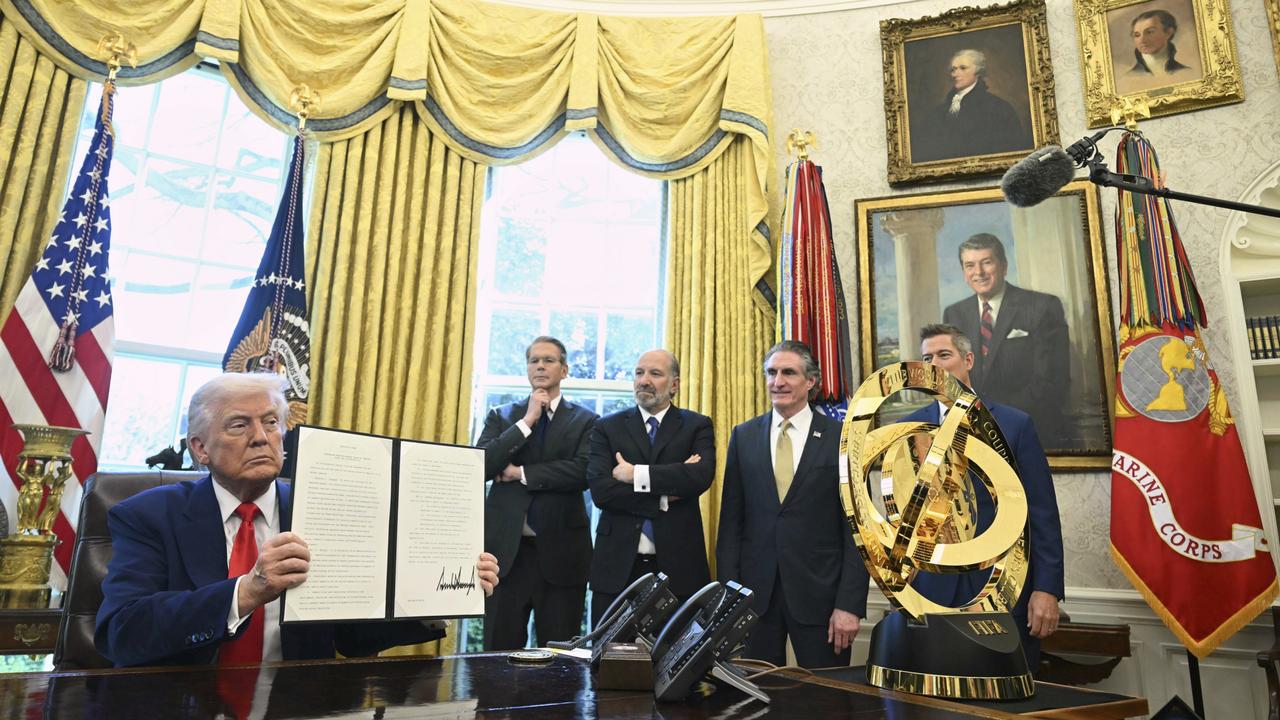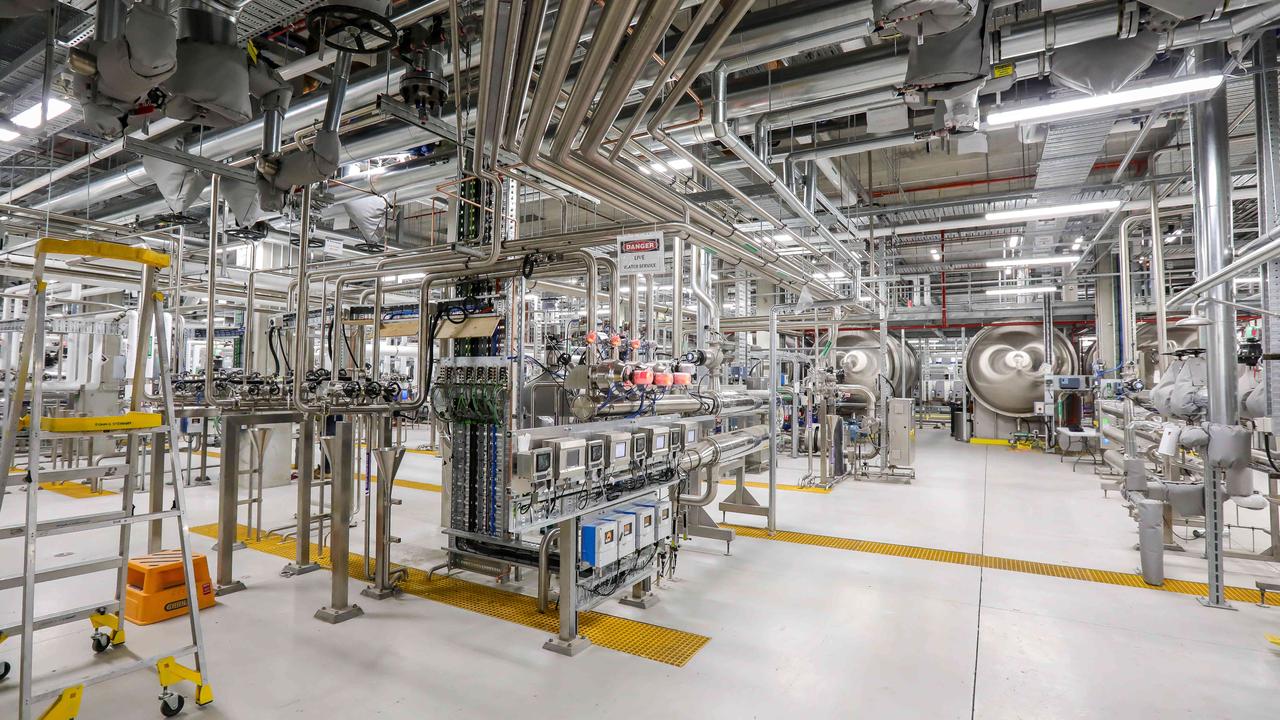Donald Trump’s tariff pause should be applauded, as China seeks new relationship with Australia
Just as Australia remains grateful for the US defence umbrella, it makes sense for Donald Trump to recognise the new relationship. Let’s talk about it.

Business
Don't miss out on the headlines from Business. Followed categories will be added to My News.
Dear Mr President, I have been writing about business for more than 60 years and have naturally seen many booms and busts. Today we saw the US market short-sellers defeated. Congratulations!
Meanwhile, China seeks a whole new relationship with Australia.
In the above context, I write this letter to alert you that a fundamental non-tariff change has taken place between our two nations. It’s the reverse of 1942 and 1951. In 1942, General Douglas MacArthur came to Australia to take control of the Allied forces. Our nation’s survival depended on the US. And again in 1951, when the ANZUS agreement was signed; it underlined our defence dependence on the US – thankfully that relationship remains today. But in 2025, totally unexpectedly, for the first time much of US defence and much of its industrial base is now dependent on one country – Australia. Such an event is rare in US history.
Suddenly, China has woken up about the US’s dependence on Australia and, not surprisingly, it seeks a whole new relationship with Australia to exploit the “anti-Trump” sentiments here.
I fear your advisers have not fully explained to you this dramatic new development. Here in Australia we are somewhat stunned and are only now coming to grips with our new US relationship and role in the world.
As you know, in modern warfare most missiles, including drones and other weapons, depend on two heavy rare earths – terbium and dysprosium. Even more important, most modern machinery using powerful electric motors relies on the same heavy rare earths when magnets are required to operate at high temperatures.
At the weekend, China imposed export licensing on terbium and dysprosium. The US obviously has stocks of the two materials, but realising the danger, it has become so desperate that it is extracting terbium and dysprosium by crushing old fluorescent lights.
Brazil has low-grade deposits of terbium and dysprosium, but without Chinese supplies the US industrial base will depend on Australia, which relatively recently discovered major deposits.

Both in business and in government nobody likes being dependent on one supplier. In your business operations you would have tried to avoid such situations, but when it happens, you will have been careful to keep good relations with the key supplier. And in business when problems arose you talked about them rather than risk a deterioration in the relationship.
That is why I don’t think your advisers have fully appraised you of the dependence of the US on Australia.
To update you, let me outline our incredible strength in terbium and dysprosium. Only in China are there comparable deposits – hence their approach. Australian Rare Earths’ Koppamurra deposit on the border of two of our states – South Australia and Victoria – has significant clay-based rare earths with good grades of terbium and dysprosium.
To its credit, the Australian government has invested to bring the project to production faster. In Western Australia, the government is also backing construction of a refinery being erected by Iluka Resources, which will tap rare earth raw materials in tailings and later material from Northern Minerals that the Chinese unsuccessfully tried to control.
Iluka also has significant deposits in Victoria. But the big discovery in Australia is close to the WA iron ore fields and run by Haoma, which is controlled by a leading opinion pollster. Gary Morgan uses a new Australian technology known as the ‘‘Elazac’’ process in the extraction process. Very high grades of terbium and dysprosium have been discovered in large ore bodies, plus gold.

At least in theory, and assuming the pilot can be scaled, Australia could be providing terbium concentrate within a year. However, the concentrates produced by Elazac will need to be refined either by an existing refinery in the US or a new operation.
When the next Australian prime minister is known after the May 3 election, rather than wait for him to call you, it might make sense for you to call him and discuss speeding up the terbium and dysprosium developments.
Meanwhile, just as Australia remains grateful for the US defence umbrella, it makes sense for the US to recognise the new relationship. When we have differences, it is better to discuss those differences before acting. I think you have made a good point about US beef being excluded from Australia, but it needs discussion. In steel, we invested heavily in American steel production when existing US steel producers were contracting. And our major steel exporter BlueScope supplies a small part of its US steel requirements from Australia. It has a bigger operation in the US than Australia.
Rather than simply apply a tariff, it should have been discussed.
And our greatest performing company, CSL, has saved countless lives in the US based on its operations there.
If there is a problem, we should talk about it before imposing penalties.

I think the fact there is now a two-way dependency will improve our relationship.
One of the great weaknesses of our current government is that it prefers to spend money on community projects rather than on defence.
Your suggestion that we spend 3 per cent of our GDP on defence was good for Australia and the US.
I hope you send someone to Australia to explain why such expenditure is in the interests of both countries.
For what it is worth, my view is that you have gone too far in tariffs, but despite that view I have spent time explaining to my readers why it was necessary for the US to take action to reverse the current global trading rules.
And one day, when the controversies over tariffs subside and the market turmoil settles, you might come to Australia to inspect our terbium and dysprosium operations.
Originally published as Donald Trump’s tariff pause should be applauded, as China seeks new relationship with Australia








